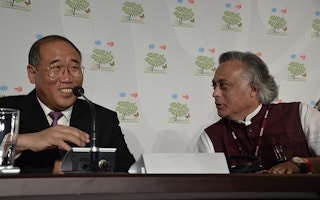As the United Nations climate talks go into the second and final week in Mexico, the future of the Kyoto Protocol is emerging to be a key sticking point for many countries.
UN climate chief Christina Figueres said at a press conference on Monday that the Kyoto Protocol - which binds some developed nations to legally binding emission targets until 2012 - was a polarising issue.
Some countries, such as Japan, have expressed that they will not commit to a second period, but developing nations say an extension of the Protocol is not negotiable.
Ms Figueres said that although the issue has divided many countries, negotiators also realise “the only way to come to an agreement is to explore a middle ground between these two positions”. Her comments come as ministers and at least 35 heads of state from across the globe are arriving in Cancun for the high-level segment of the meeting which kicks off on Tuesday at 3pm.
“There is already an active search for that middle ground… there’s no reason to believe that non-agreement of the Kyoto Protocol will be the result,” she said. “Governments know it is their responsibility to find a solution to that.”
Over the weekend, freshly updated sets of texts for both Kyoto Protocol and the long-term cooperative action (LCA) were issued. But these texts remain “too long, have too many options and are much too complicated”, said European Union climate action commissioner Connie Hedegaard on Monday.
“Where do things stand five days before this meeting ends? Generally some progress was made… but the texts are not ready to be used by ministers to finalise the deal,” she said. “The challenge is in the next 48 hours… it requires us to step up the pace in negotiations… and the early involvement of ministers is crucial,” she said.
Conference president Mrs Patricia Espinosa added in a statement that the politicans “can provide the necessary political guidance to push forth on several key issues”.
But major countries such as Brazil, South Africa, India and China, which form the BASIC group of countries, said they will not budge on certain issues. Those are an extension to the Kyoto Protocol, the urgent need for short-term finance, and the technology transfer from developed to developing countries.
These three elements are “non-negotiable for us”, India’s environment minister Jairam Ramesh told the media.
Still, he pledged the group’s commitment to provide “constructive support” for a positive outcome at Cancun.
US climate change envoy Todd Stern said that the issue of transparency was a priority for the US. The climate deal will have to include a system whereby developing countries have to prepare a report which would include carbon inventories, mitigation actions and other critical information.
The current updated texts on mitigation and how pledges can be transparent are “inadequate” for the US, he noted. “But I think everyone understood it was going to need work. It’s a start.”
Mr Stern said he could not predict the result of the talks at Cancun but that he could see “a workable result that has decisions across all the major areas”.
Meanwhile, businesses are calling for governments to provide an outcome that will give them political certainty.
Virgin chief executive Richard Branson, who was in Cancun to launch a web-based initiative to reduce shipping emissions by as much as 25 per cent over the next 20 years, said that if governments fail, the private sector will have to pick up the slack.
The global industry should be able to remove 17 billion tonnes of projected CO2 emissions by 2020, he said. He added that carbon taxes could be useful, but that everyone must share the burden in the form of a global tax.
Mexican conference president Mrs Espinosa stressed on Monday that the conference will be highly transparent and that there will be “no hidden text and no secret negotiations” in the meeting’s final days.

















